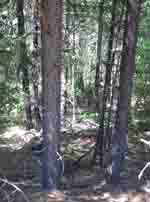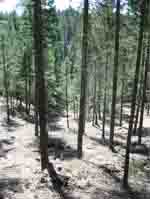Long Term Forest Stewardship

The forests of the Trinity Basin were fire adapted ecosystems which have been drastically altered from their natural state by past logging operations. Landscape scale restoration is necessary both to keep the ecosystem healthy and to ensure that the forests will continue to be productive for future generations. A major component of landscape restoration is understanding how fire traditionally affected this ecosystem. The forests have developed into systems which cannot handle natural, regenerative fires. Instead, there are very tight stands of trees with biomass littering the forest floor; promoting uncontrollable fires which could be very destructive to the landscape. The trinity basin fire learning network was created to educate on how to prevent uncontrolled fires, how and where to thin stands and clean up forest floor litter, and how to use prescribed burns to positively influence the health of an area.
Trinity Forest Restoration Collaborative (TFRC)

The WRTC is one of the founding organizations of the TFRC along with Citizens for Better Forestry (CBF), the Center for Biological Diversity, Environmental Protection Information Center (EPIC), Sustainable Northwest, Klamath Siskiyou Wildlands Center (KS Wild), and the Shasta-Trinity National Forest. The WRTC is in charge of coordinating meetings and making information available to participants and the public. To explore methods of accelerating landscape scale restoration they will be using the Big Creek watershed as a testing ground. The Collaborative seeks to form agreements that will involve the local workforce and create forest stewardship goals compatible with social goals within the surrounding forest communities.
Trinity Basin Fire Learning Network
The WRTC is involved with the Trinity Basin Fire Learning Network. Along with many local partner organizations involved in the Network, the WRTC is helping to address the issues of forest restoration, fuels reduction, and biodiversity protection in the Trinity Basin. The WRTC holds workshops to educate partners about land management in a fire adapted ecosystem which is in need of restoration. Topics such as prescribed burning are discussed and participants engage in a prescribed burn. Restoration jobs for forest stewards have emerged from their efforts and fuels reduction has become a more local effort. The Trinity Basin Fire Learning Network is currently involved in several projects in the region. The WRTC is involved in developing stewardship contracts that accomplish local goals and also pay for restoration services from forest products harvested from these areas.
http://www.tncfire.org/documents/dispatch_06_06.pdf